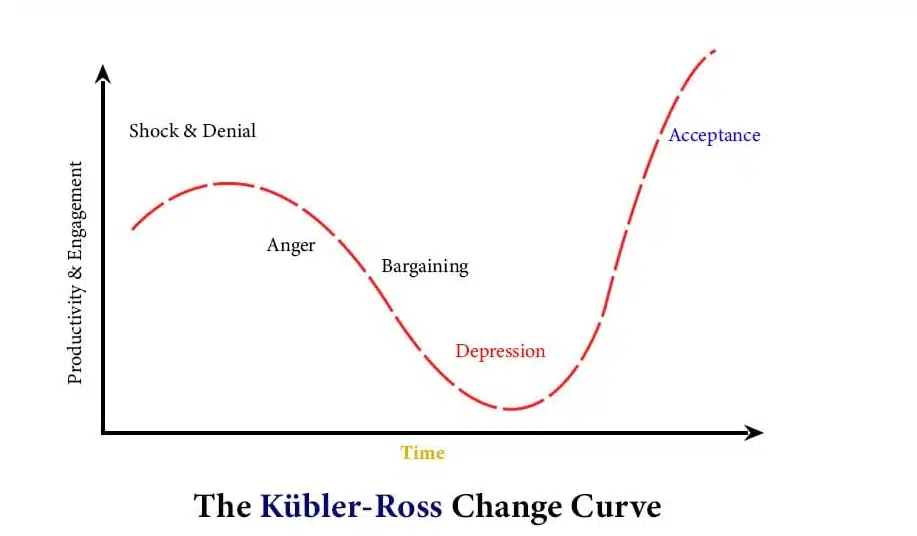Kübler-Ross model of grief

The Kübler-Ross Model (also known as the “Five Stages of Grief” or “DABDA”) is a psychological model which states that people who experience grief go through five stages of emotions:
- Denial – The first reaction is denial. In this stage, individuals believe the precipitating event is somehow mistaken, and cling to a false, preferable reality. Some may also isolate themselves, avoiding others who may have accepted what is happening. This stage is usually a temporary defense, so long as the person has adequate time to move amongst the stages as they contemplate death. In her book, Kübler-Ross states that technological advancements have caused people to become fearful of violent, painful deaths; therefore, in order to protect the psychological mind, they deny the reality of their own inevitable death.
- Anger – When the individual recognizes that denial cannot continue, they become frustrated, especially at proximate individuals. Certain psychological responses of a person undergoing this phase would be: "Why me? It's not fair!"; "How can this happen to me?"; "Who is to blame?"; "Why would this happen?". Some may lash out at loved ones, medical staff, and other family. In Kübler-Ross's other book, Questions and Answers on Death and Dying, she emphasizes the need for people to do their best to let those who are in this stage feel their feelings and try not to take the anger personally.
- Bargaining – The third stage involves the hope that the individual can avoid a cause of grief. Usually, the negotiation for an extended life is made in exchange for a reformed lifestyle. People facing less serious trauma can bargain or seek compromise. Examples include the terminally ill person who "negotiates with God" to attend a daughter's wedding, an attempt to bargain for more time to live in exchange for a reformed lifestyle or a phrase such as "If I could trade their life for mine".
- Depression – "I'm so sad, why bother with anything?"; "I'm going to die soon, so what's the point?"; "I miss my loved one; why go on?"
During the fourth stage, the individual despairs at the recognition of their mortality. In this state, the individual may become silent, refuse visitors and spend much of the time mournful and sullen. - Acceptance – "It's going to be okay."; "I can't fight it; I may as well prepare for it."
In this last stage, individuals embrace mortality or inevitable future, or that of a loved one, or other tragic event. People dying may precede the survivors in this state, which typically comes with a calm, retrospective view for the individual, and a stable condition of emotions.


